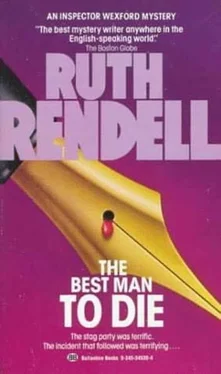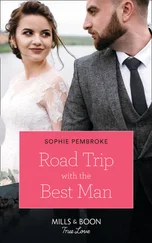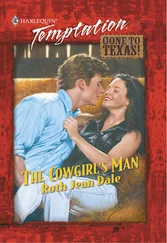Ruth Rendell - The Best Man To Die
Здесь есть возможность читать онлайн «Ruth Rendell - The Best Man To Die» весь текст электронной книги совершенно бесплатно (целиком полную версию без сокращений). В некоторых случаях можно слушать аудио, скачать через торрент в формате fb2 и присутствует краткое содержание. Жанр: Детектив, на английском языке. Описание произведения, (предисловие) а так же отзывы посетителей доступны на портале библиотеки ЛибКат.
- Название:The Best Man To Die
- Автор:
- Жанр:
- Год:неизвестен
- ISBN:нет данных
- Рейтинг книги:4 / 5. Голосов: 1
-
Избранное:Добавить в избранное
- Отзывы:
-
Ваша оценка:
- 80
- 1
- 2
- 3
- 4
- 5
The Best Man To Die: краткое содержание, описание и аннотация
Предлагаем к чтению аннотацию, описание, краткое содержание или предисловие (зависит от того, что написал сам автор книги «The Best Man To Die»). Если вы не нашли необходимую информацию о книге — напишите в комментариях, мы постараемся отыскать её.
The Best Man To Die — читать онлайн бесплатно полную книгу (весь текст) целиком
Ниже представлен текст книги, разбитый по страницам. Система сохранения места последней прочитанной страницы, позволяет с удобством читать онлайн бесплатно книгу «The Best Man To Die», без необходимости каждый раз заново искать на чём Вы остановились. Поставьте закладку, и сможете в любой момент перейти на страницу, на которой закончили чтение.
Интервал:
Закладка:
As yet it was only eight o’clock and the sun reluctant to leave without treating its worshippers to a pyrotechnic display of rose and gold flames that burnt up the whole western sky. Wexford stood on the south side of the bridge and listened to the river chuckling. Such an innocent river, for all that it knew a secret, for all that one of its stones had put a man out of sight of the sunset!
All the Street windows of the Olive and Dove were open, the curtains fanning out gently over window boxes and over fuchsias that dripped red flowers. On the forecourt a band of Morris dancers had assembled. They wore the motley coat of jesters and one of them was hopping around on a hobby horse. To his amusement Wexford picked out George Carter among the company.
‘Lovely night, Mr Carter,’ he said jovially. Rather shame facedly Carter waved at him a stick with ribbons and bells on. Wexford went into the saloon bar.
At a table in the alcove on the dining-room wall sat the girl Camb had brought to him earlier in the day, an elderly woman and a man. Wexford brought his beer and as he passed them the man got up as if to take his leave.
‘Good evening,’ Wexford said. ‘Have you decided to stay at the Olive?’
The girl was sparing with her smiles. She nodded sharply to him and said, naming his rank precisely, ‘I’d like you to meet my father’s solicitor, Mr Updike. Uncle John, this is Detective Chief Inspector Wexford.’
‘How do you do?’
‘And I don’t think you’ve met my aunt, Mrs Browne?’
Wexford looked from one to the other. Marvellous the way he always had to do Camb’s work for him! The aunt was looking pale but excited, the solicitor gratified. ‘I’m quite prepared to accept that you’re Miss Fanshawe now, Miss Fanshawe,’ Wexford said.
‘I’ve known Nora since she was so high,’ said Updike. ‘You need have no doubt that this is Nora.’ And he gave Wexford a card naming a London firm, Updike, Updike and Sanger of Ava Maria Lane. The chief inspector looked at it, then again at Mrs Browne who was Nora Fanshawe grown old. ‘I’m satisfied.’ He passed on to an empty table.
The solicitor went to catch his train and presently Wexford heard the aunt say:
‘I’ve had a long day, Nora. I think I’ll just give the hospital a ring and then I’ll go up to bed.’
Wexford sat by the window, watching the Morris dancers. The music was amateurish and the performers self-conscious, but the evening was so beautiful that if you shut your eyes to the cars and the new shop blocks you might imagine yourself briefly in Shakespeare’s England. Someone carried out to the nine men a tray of bottled beer and the spell broke.
‘Come into the lounge,’ said a voice behind him.
Nora Fanshawe had removed the jacket of her suit and in the thin coffee-coloured blouse she looked more feminine. But she was still a creature of strong straight lines and planes and angles and she was still not smiling.
‘May I get you a drink, Miss Fanshawe?’ Wexford said, rising.
‘Better not.’ Her voice was abrupt and she didn’t thank him for the offer. ‘I’ve had too much already.’ And she added with a dead laugh, ‘We’ve been what my aunt calls celebrating. The resurrection of the dead, you see.’
They went into the lounge, sat down in deep cretonne covered armchairs and Nora Fanshawe said:
‘Mr Updike wouldn’t tell me the details of the accident. He wanted to spare me.’ She beckoned to the waiter and said without asking Wexford first, ‘Bring two coffees.’ Then she lit a king-size cigarette and slipped it into an amber holder. ‘You tell me about it,’ she said.
‘You don’t want to be spared?’
‘Of course not. I’m not a child and I didn’t like my father.’ Wexford gave a slight cough. ‘At about ten o’clock on May 20th,’ he began, ‘a man driving a petrol tanker on the north to south highway of Stowerton by-pass saw a car overturned and in flames on the fast lane of the south to north track. He reported it at once and when the police and ambulance got there they found the bodies of a man and a girl lying on the road and partially burned. A woman – your mother – had been flung clear on to the soft shoulder. She had multiple injuries and a fractured skull.’
‘Go on.’
‘What remained of the car was examined but, as far as could be told, there was nothing wrong with the brakes or the steering and the tires were nearly new.’
Nora Fanshawe nodded.
‘The inquest was adjourned until your mother regained consciousness. The road was wet and your mother has suggested that your father may have been driving exceptionally fast.’
‘He always drove too fast.’ She took the coffee that the waiter had brought and handed a cup to Wexford. He sensed that she would take it black and sugarless and he was right. ‘Since the dead girl wasn’t I,’ she said with repellently fault less grammar, ‘who was she?’
‘I’m hoping you’ll be able to tell us that.’
She shrugged, ‘How should I know?’
Wexford glanced at the curled lip, the hard direct eyes. ‘Miss Fanshawe,’ he said sharply, ‘I’ve answered your questions, but you haven’t even met me half-way. This afternoon you came to my office as if you were doing me a favour. Don’t you think it’s time you unbent a little?’
She flushed at that and muttered. ‘I don’t unbend much.’
‘No, I can see that. You’re twenty-three, aren’t you? Don’t you think all this upstage reserve is rather ridiculous?’
Her hand was small, but, ringless and with short nails as it was, it was like a man’s. He watched it move towards the cup and saucer and for a moment he thought she was going to take her coffee, get up and leave him. She frowned a little and her mouth hardened.
‘I’ll tell you about my father,’ she said at last. ‘It might just help. I first knew about his infidelities when I was twelve,’ she began. ‘Or, let me say, I knew he was behaving as other people’s fathers didn’t behave. He brought a girl home and told my mother she was going to stay with us. They had a row in my presence and when it was over my father gave my mother five hundred pounds.’ She took the cigarette stub from her holder and replaced it with a fresh one. This sudden chain smoking was the only sign she gave of emotion. ‘He bribed her, you understand. It was quite direct and open. “Let her stay and you can have this money”. That was how it was. The girl stayed six months. Two years later he bought my mother a new car and at just the same time I caught him in his office with his secretary.’ She inhaled deeply. ‘On the floor,’ she said coldly. ‘After that it was an understood thing that when my father wanted a new mistress he paid my mother accordingly. By that I mean what he thought the girl was worth to him. He wanted my mother to stay because she was a good hostess and kept house well. When I was eighteen I went up to Oxford.'
‘After I got my degree I told my mother I could keep her now and she should leave my father. Her response was to deny everything and to tell my father to stop my allowance. He refused to stop it – mainly because my mother had asked him to, I suppose. I haven’t drawn it for two years now, but…’ She glanced swiftly at her bag, her watch. ‘You can’t always refuse to take presents,’ she said tightly, ‘not when it’s your own mother, not when you’re an only child.’
‘So you took a job in Germany?’ Wexford asked.
‘I thought it would be as well to get away.’ The flush returned, an unbecoming mottled red. ‘In January,’ she said hesitantly, ‘I met a man, a salesman who made business trips to Cologne from this country.’ Wexford waited for her to talk of love and instead heard her say with a strange sense of shock, ‘I gave up my job, as I told you, and came back to London to live with him. When I told him that if we were to be married I wouldn’t ask my father for a penny he… well, he threw me out.’
Читать дальшеИнтервал:
Закладка:
Похожие книги на «The Best Man To Die»
Представляем Вашему вниманию похожие книги на «The Best Man To Die» списком для выбора. Мы отобрали схожую по названию и смыслу литературу в надежде предоставить читателям больше вариантов отыскать новые, интересные, ещё непрочитанные произведения.
Обсуждение, отзывы о книге «The Best Man To Die» и просто собственные мнения читателей. Оставьте ваши комментарии, напишите, что Вы думаете о произведении, его смысле или главных героях. Укажите что конкретно понравилось, а что нет, и почему Вы так считаете.












